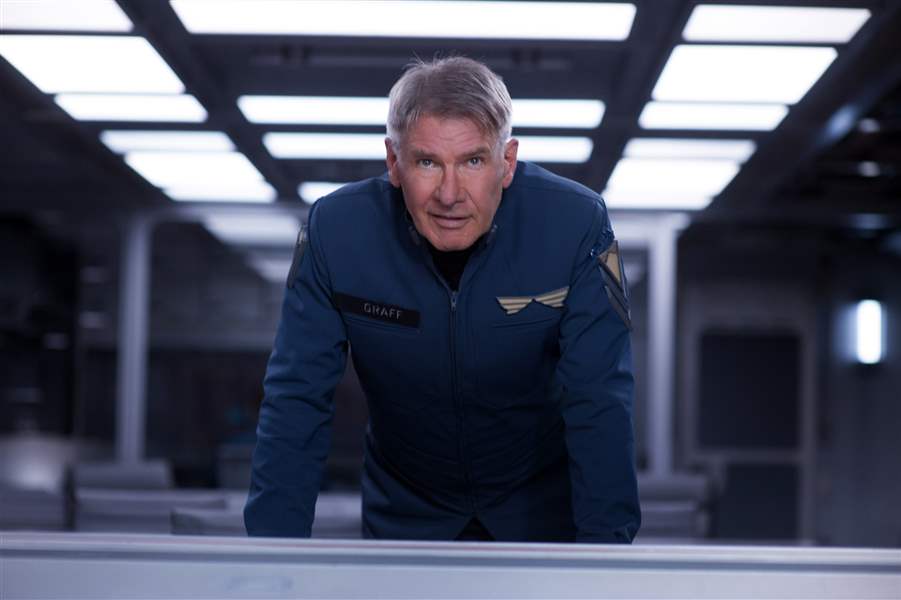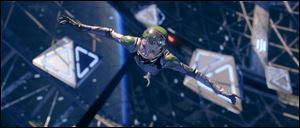
Hood improves with 'Ender's Game'
Movie based on Orson Scott Card’s 1985 novel overcomes flaws
11/1/2013
Harrison Ford in a scene from "Ender's Game."
ASSOCIATED PRESS

Asa Butterfield in a scene from "Ender's Game."

Harrison Ford in a scene from "Ender's Game."
Future Earth is in peril from an alien armada and our only savior is a brilliant military tactician named Andrew "Ender" Wiggin. Ender also happens to be a boy.
Far from the de rigueur young adult science-fiction and fantasy populating book stores and movie theaters, however, Ender's Game is the long-in-gestation adaptation of Orson Scott Card's 1985 novel. This acclaimed novel-turned-film offers meaty themes and allegory to chew on beyond troubled schoolyard crushes: the military-industrial complex, fascism, and even the nature and importance of war.
The story is built on a character as complicated as he is gifted. Ender is a coldly analytical but warm leader, violent but humane, offering a way out for his enemies before he breaks them. The youngest of three, Ender has the aggressive tendencies of his brother Peter and the compassion of his sister Valentine, with whom he is especially close, and he wrestles with finding balance in both DNA traits.
Written and directed by Gavin Hood
Based on the Orson Scott Card novel.
A Summit release, playing at Cinemark Franklin Park, Fallen Timbers, and Levis Commons.
Rated PG-13 for some violence, sci-fi action, and thematic material
Running time: 114 minutes.
Critic’s Rating ★★★
Cast: Asa Butterfield, Harrison Ford, Viola Davis, Ben Kingsley
★★★★★ Outstanding; ★★★★ Very Good; ★★★ Good; ★★ Fair; ★ Poor
As Ender, Asa Butterfield, the impressive young actor who drew raves as the lead role in 2011's Hugo, showcases impressive restraint from histrionics as the emotionally conflicted character. Likewise, Ender's Game is bolstered by its supporting cast of Harrison Ford, Ben Kingsley, Viola Davis, Hailee Steinfeld (True Grit), and Abigail Breslin (Little Miss Sunshine) as Valentine.
Ford plays Colonel Graff, the shrewd military leader in charge of a save-the-Earth program that recruits intelligent children like Ender to wage space warfare as a video game. Young hands and minds are quicker than those of adults to adapt to the new technologies and stresses of controlling starships behind computer screens, and therefore make for better military strategists.
And no one shows as much promise as Ender. Graff is so sure Ender is the chosen one, he pushes the boy in secret psychological experiments meant to shape and toughen his mental makeup for the end cause: a military leader who acts with impunity from his own conscious. Major Gwen Anderson (Viola Davis) questions these tactics, but Ender excels in the program, overcoming teenage bullies, cadet training exercises, and leading a squadron of inexperienced misfits, including his friend and only girl in the group, Petra Arkanian (Hailee Steinfeld).
Preparing Ender in the final stage of his training is a face-tattooed war hero-turned mentor (Kingsley), an underwritten character never as menacing as we're initially sold.
This all funnels to Ender his greatest challenge, to lead our fleet into a major battle against the returning aliens, ant-like insectoids known as Formics. But a series of dreams and telepathic images causes Ender to wonder if there's more to the Formic invasion than our destruction.
It doesn't take much digging in this nearly 30-year-old story of the future to find parallels to our world today, including unquestioned patriotism to a cause, children as test-tubes, and a military-industrial complex no longer left in check. One's reaction to any and all of it will likely depend on his or her political persuasion, with substance to support all views. Unlike Paul Verhoeven's Starship Troopers, there's no definitive anti-anything hook — there's also a deliberate lack of Starship Troopers' blood and gore.
What writer-director Gavin Hood excised from the novel will invariably disappoint many of the book's hard-core fans, and leave those who haven't read it — this critic included — to wonder and assume. There's no explanation of the one-world military government, for example — it just is — while the rule of two children per family is awkwardly introduced as a passing comment. I had to look it up to verify its place in the novel. More egregious to the film is the unresolved fate of a character Ender mortally wounds in a skirmish.
Hood's dialogue occasionally turns teenage lit drama, especially when Ender is bullied by his fellow cadets, and a few of the younger actors are out of their league in a major film.
Despite its flaws, Ender's Game represents a marked improvement from Hood's 2009 misfire X-Men Origins: Wolverine. The film is salvaged by a strong core cast, an ambitious scope that features space stations, asteroids, planets, and massive space battles — with special effects that mostly pull it off — and a story about a special boy that proves to be anything but a kids' book.
Contact Kirk Baird at kbaird@theblade.com or 419-724-6734.